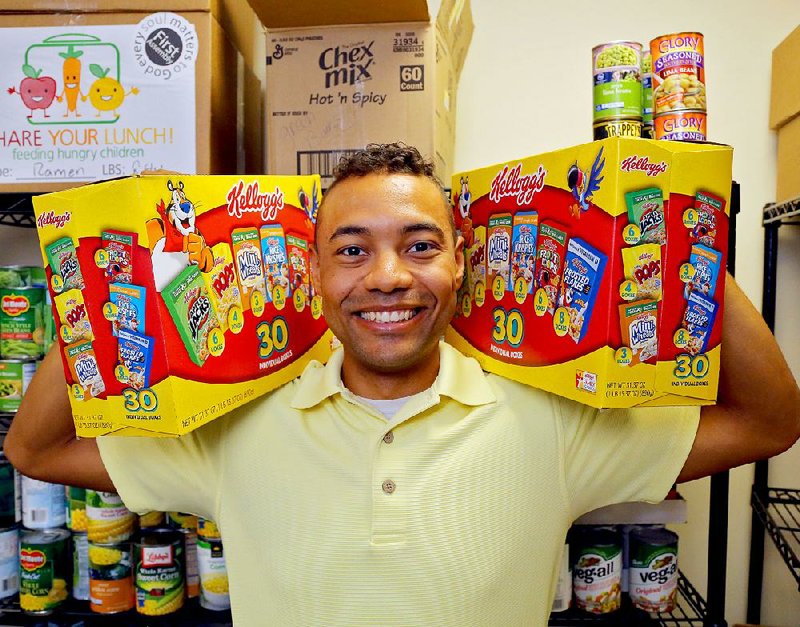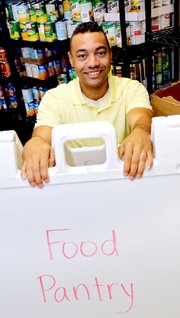Brandon Mathews has an offering for student services director Michelle Anderson, who runs the food pantry at Pulaski Technical College: hamburger and hot dog buns from his wife's work picnic. Not a vat of olive oil or a ruck of California almonds -- not big-ticket -- but Anderson says she knows just the woman who will love it.
Then Mathews says something that perks this reporter's ears up: "Summers are always a challenge keeping [the pantry] stocked, I know."
Mathews' mission is college campus food pantries. He was, as an undergraduate in Fayetteville, once an operator of one, and a user.
Did you know this was a thing? Hungry undergrads? It is, he says.
In the near future he plans to publish a blog post at the Brookings Institute called "The Narrative of Hungry College Students: A Prescription for Policymakers." In it, he suggests that hungry college students are as much a part of that select population as hungry people are a part of the general population.
But why would summers be a drain on the pantry? A desert breeze fans the shelves and, whisk, no more Kellogg's single-serving eight-pack cereals?
Nope, says Anderson. Fewer gifts. Pantry visits remain relatively stable, but mainstay almsgivers go on vacation. (I wonder if business at the pantry in Destin, Fla., picks up?)
Pity for Mathews he's such a poor face for the poor. He's trim and good-looking and a dapper dresser (though in that ineffable way that could be country club, could be Kohl's). At 24, he's married to a future pharmacist, and newly graduated from the Clinton School of Public Service. (OK, that last part comports with drive toward social remedy.)
Growing up, dad was a long-haul trucker and mom a manager at McDonald's. In high school he began noticing his parents bringing home groceries, not in plastic bags, but in corrugated cardboard boxes. He always had enough to eat, he says, but the brands he'd get to know would change, from Campbell's to Great Value to "something cheaper."
Balancing tuition, room and board at the University of Arkansas at Fayetteville required the full complement of federal grants and student loans, as well as his and his parents' savings and what he took home working at Blockbuster. As a sophomore his aid was affected by a slip-up in his parents' IRS filing, and suddenly, he was eating like a Victorian foundling from an occult hand -- big pots of jasmine rice with Sriracha hot sauce and crackers for dinner, a dollop of peanut butter "for protein."
That year, he began volunteering at the campus pantry -- the Full Circle Campus Food Pantry. For a long time he didn't avail himself of the nonperishables. "I always felt there's gotta be someone hungrier than me," and besides, how would it look?
Eventually, "I caved." One good thing about Full Circle is it's housed in a discreet location, and foodstuffs are packed in nondescript bags. "We don't brand anything," he said. Another good thing is the (comparatively) ready supply of fresh fruits and vegetables from the campus garden and local farmers.
One time a huge supply of eggplant came in. People complained, "I don't know how to cook eggplant," and Mathews had to tell them to pull out their smartphones, type "eggplant recipes" into a search box, and take a magical trip back to a time before drive-through. Like the Arkansas Foodbank and many other safety net services around the state, Full Circle began offering tutorials called Cooking Matters and Shopping Matters -- instructions on how to prepare a meal (mostly) from scratch, and how to shop well on a budget.
Here's a question he gets a bunch: What's stopping anyone from cheating the system? Picking up a load of free groceries, then spending a paycheck on video games? Mathews says it's basically an honor system service. In his experience, "people who are here don't want to be here."
Yet, he wants to build more of them.
In May he impressed some Little Rock business leaders at a regular Tuesday luncheon of the Rotary Club 99. "I was sitting there at the head table, if I recall," says Bob Denman, Rotary club president, "and I got three text messages from people sitting in the crowd [as Mathews spoke] saying, 'Ooo, I know how we can fund this'" planned pantry at the University of Arkansas at Little Rock.
Mathews says, "A couple individuals said later, 'You know, when I was in school, I was a hungry student, but we didn't even have this idea of a campus food pantry. I sure would've liked it.'"
UALR plans to open its pantry at the beginning of the year. Denman, the school's vice chancellor for advancement, said the money will come from annual giving and student-led philanthropy -- "students raising money to help other students."
Mathews says, "We've known there's always been students who are food insecure or dealing with poverty ... and honestly, when people hear that this is an issue, they legitimately care. You don't have to get people to buy in."
Today, Mathews is looking for work while an associate director of campus resources for the College and University Food Bank Alliance (CUFBA) -- a volunteer position, for now. From 1993 to this year the number of CUFBA food banks at colleges and universities has grown from one (Michigan State University's) to 184. Why? Perhaps because an increasingly nontraditional student body composed of returning soldiers, single parents or previous drop-outs are greeted by ungovernable tuition inflation.
In-state tuition and fees have more than doubled since 2004 at UALR and more than doubled since 2001 at UA-Fayetteville. On average, four-year public institutions almost exactly doubled their tuition and fees from the 2002-03 academic year to the 2012-13 academic year, according to the National Center for Education Statistics.
"You've got more people still competing for the same pool of money and resources with different responsibilities and challenges in their lives," Mathews said.
High Profile on 08/30/2015


